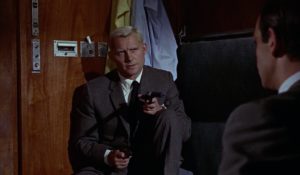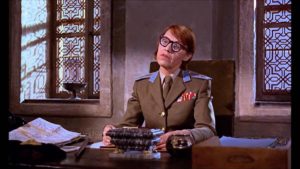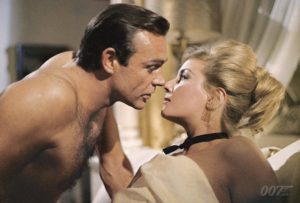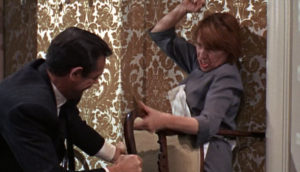Diamonds Are Forever’s greatest, though far from sole, flaw was its villains. Unmemorable, underdeveloped, not scary, and nothing but cheesy gangster stereotypes that made the novel feel its age. Thankfully, Ian Fleming seems to have been aware of such problems and, in his next novel, From Russia with Love, introduces his all-new antagonist, an unstoppable force of nature, on the very first page. Donovan ‘Red’ Grant is the type of villain I never thought I’d see in the James Bond franchise. As much as I love a classic megalomaniac, I adore the idea of an unrelenting, barely human personification of pure evil. A figure similar to Anton Chigurh from No Country for Old Men or Lorne Malvo from Fargo. Grant is just that. A serial killer, a beast in human form, a villain who feels fiercely, shockingly modern.
 There’s nothing funny about Grant. No character quirk or bizarre detail. He’s simply the best killer on the planet. A German-Irish man, Grant defected to the Soviets not because of political allegiance but because “a great deal of killing had to be done in the USSR as an instrument of policy.” He’s there because he knows they have the most use for his skills. Grant wants absolute supremacy over the field of murder and soon finds himself the Chief Executioner of SMERSH. To keep him satiated, the Russians allow him to execute prisoners once a month, with whichever implements he desires, on the night of the full moon, another detail that makes him seem bestial and subhuman.
There’s nothing funny about Grant. No character quirk or bizarre detail. He’s simply the best killer on the planet. A German-Irish man, Grant defected to the Soviets not because of political allegiance but because “a great deal of killing had to be done in the USSR as an instrument of policy.” He’s there because he knows they have the most use for his skills. Grant wants absolute supremacy over the field of murder and soon finds himself the Chief Executioner of SMERSH. To keep him satiated, the Russians allow him to execute prisoners once a month, with whichever implements he desires, on the night of the full moon, another detail that makes him seem bestial and subhuman.
Grant is more like a person you’d see interviewed in an episode of Mindhunter than going up against James Bond. As a teenager he would kill an animal once a month to quench his bloodlust, his victims gaining in size each time until he murdered a tramp. Soon it was young women, but he had no sexual desire of any kind, finding such a thing “incomprehensible.” Fleming describes him as a “lump of inanimate meat.” A doll, “drowned and morgue-like.” He’s a terrifying character and the early chapters we spend in his disturbing mind, privy to his thoughts and remembrances, are fantastic, both as their own story and as the ultimate set-up for a new villain who we know will at some point will cross paths with 007.
 It’ll be a long time until hero and villain meet, and, in fact, a long time until we, the reader, catch up with Bond again. He’s absent from the first third of the novel, which instead focuses on the villainous SMERSH as they put their plan to eliminate Bond into motion. For 120 pages taking place in drab Soviet offices, it’s surprisingly not boring and, actually, is very engaging, even though Fleming is simply detailing what will happen in the book’s second half. The Soviets run through Bond’s past missions and tie everything together. From Russia with Love feels like a culmination of the series thus far, and was very nearly Fleming’s final novel in the series. SMERSH are going after Bond because they wish to destroy the myth of the British hero rather than simply eliminate a thorn in their side. A plan is put in place to create a scandal to assassinate his character as well as the man.
It’ll be a long time until hero and villain meet, and, in fact, a long time until we, the reader, catch up with Bond again. He’s absent from the first third of the novel, which instead focuses on the villainous SMERSH as they put their plan to eliminate Bond into motion. For 120 pages taking place in drab Soviet offices, it’s surprisingly not boring and, actually, is very engaging, even though Fleming is simply detailing what will happen in the book’s second half. The Soviets run through Bond’s past missions and tie everything together. From Russia with Love feels like a culmination of the series thus far, and was very nearly Fleming’s final novel in the series. SMERSH are going after Bond because they wish to destroy the myth of the British hero rather than simply eliminate a thorn in their side. A plan is put in place to create a scandal to assassinate his character as well as the man.
Because of the Moscow setting, From Russia with Love is the most actively political book in the series. In fact, this is the novel that launched Bond into popularity because of its political prescience, with news of Anthony Eden visiting Fleming at his Goldeneye estate and the book being on JFK’s top ten list becoming public knowledge. At the meeting of several Soviet intelligence heads, real people and cases are mentioned and discussed, such as the Khokhlov affair, and the USSR’s use of soft-hard politics. This meeting is certainly overlong at three entire chapters but I enjoyed this rare insight and it felt like a meeting you’d see in an old Bond film. The idea of the meeting being recorded for their superiors makes each participant try to catch out the others while trying not to fall for any traps and say something negative about their nation themselves, adding vital tension to what could be a dull affair.
 Two key figures decide the details of the plan to kill Bond. Kronsteen, an emotionless strategist to whom “all people were chess pieces,” and Colonel Rosa Klebb. Most of Fleming’s descriptions of Klebb are about her physical characteristics rather than her history, personality, or ideology. The writer managed to contain himself when it came to Grant, to not fall into the realms of the grotesque to make a character disturbing. With Klebb, Fleming explodes. She’s squat and dumpy, described as disgusting, with breasts like a “badly packed sandbag”, and, in totality, is “the oldest and ugliest whore in the world.” The “toad-like figure” is “a neuter” who sleeps with both men and women, and Fleming again uses homosexuality as a villainous trait. These descriptors haven’t all aged well and stick out even more because so much of the book feels modern, from its characters to its atypical structure, but Klebb certainly remains an interesting villain and the description of her constantly-moving wet mouth is disgusting.
Two key figures decide the details of the plan to kill Bond. Kronsteen, an emotionless strategist to whom “all people were chess pieces,” and Colonel Rosa Klebb. Most of Fleming’s descriptions of Klebb are about her physical characteristics rather than her history, personality, or ideology. The writer managed to contain himself when it came to Grant, to not fall into the realms of the grotesque to make a character disturbing. With Klebb, Fleming explodes. She’s squat and dumpy, described as disgusting, with breasts like a “badly packed sandbag”, and, in totality, is “the oldest and ugliest whore in the world.” The “toad-like figure” is “a neuter” who sleeps with both men and women, and Fleming again uses homosexuality as a villainous trait. These descriptors haven’t all aged well and stick out even more because so much of the book feels modern, from its characters to its atypical structure, but Klebb certainly remains an interesting villain and the description of her constantly-moving wet mouth is disgusting.
The plan relies on a lure. A beautiful woman, claiming to be in love with James, who wishes to defect to the West, bringing with her an equally-irresistible decoding machine, will draw Bond to Istanbul and there the Soviets will concoct a sex scandal and homicide to kill Bond and embarrass his government. The woman is to be Tatiana Romanova and she’ll know only part of the plan. Tatiana’s introductory chapter is one of Fleming’s finest, which is a shock considering his female characters are often his weakest. It’s a great introduction to her and her conflicted feelings on the USSR. It’s all she’s known, she’s grateful for the opportunity to be involved in something, she’s innocent and naïve, she’s trapped, she’s scared. There are no long descriptions of Moscow as I feared we’d get from Fleming but instead a constant, potent atmosphere of fear born from the Soviet system. More so than the film version of the character, Tatiana reminded me of Nina from The Americans, and that’s who I pictured in my mind.
 120 pages into From Russia with Love, with the villainous plan in motion, we finally return to Bond who’s doing… absolutely nothing. With no missions for months, Bond is living the soft life. He’s so bored he’s become involved in office politics, making himself a nuisance inside his own organisation for kicks. It’s a fun piece of characterisation and makes me long for a Secret Service workplace sitcom with Bond giving side eye to the camera. He’s also somewhat depressed because, after several happy months together and talk of marriage, Tiffany Case has left Bond for another man. I was wondering how the question of Case would be resolved and I much prefer the idea of her leaving Bond than vice versa. I like the character and I’m glad it ended on a happy note, for her. Bond being lovesick and bored is a dangerous combination and is both good for character and plot, with him now being more likely to spring an obvious trap than before.
120 pages into From Russia with Love, with the villainous plan in motion, we finally return to Bond who’s doing… absolutely nothing. With no missions for months, Bond is living the soft life. He’s so bored he’s become involved in office politics, making himself a nuisance inside his own organisation for kicks. It’s a fun piece of characterisation and makes me long for a Secret Service workplace sitcom with Bond giving side eye to the camera. He’s also somewhat depressed because, after several happy months together and talk of marriage, Tiffany Case has left Bond for another man. I was wondering how the question of Case would be resolved and I much prefer the idea of her leaving Bond than vice versa. I like the character and I’m glad it ended on a happy note, for her. Bond being lovesick and bored is a dangerous combination and is both good for character and plot, with him now being more likely to spring an obvious trap than before.
Fleming seems to be intentionally drawing parallels between the factions at play in the novel. In his meeting with M where he’s given his mission briefing, Bond utters the exclamation “God” in front of his boss and immediately regrets it, and the exact same thing happens in Tatiana’s meeting with Klebb. Both are even questioned on their sexual history by their superiors in similar fashions, although M is far more uncomfortable about it. Grant has a past as a strongman in the circus, as does Bond’s ally in Istanbul, Kerim Bey. There’s a definite attempt to compare those on either side of the conflict; the heroes and villains are almost dual protagonists with their own viewpoints and stories. But also, differences are explored, like the great Soviet machine versus the family business of Kerim and the few, underpaid men of the British Secret Service.
 Each James Bond novel has at least one ‘journey to…’ chapter. They chart Bond’s travel to the next location, usually by plane. From Russia with Love by far has the best because its not a simple travelogue with descriptions of the food and how comfortable the seats are. It’s full of character and even theme. Bond reflects on his life and work in a way that feels conclusive. He ponders his destiny and what his teenage self would feel if he saw the hardened man he is today. He’s become a pimp for England, needing to fall in love for his country, but can he do it? There’s no artificial drama about it being his most dangerous mission like in Diamonds Are Forever, just a different task he doesn’t know if he can accomplish. Although, it likely is his most dangerous mission too. Because we know, to some extent, what is to come, there’s a tension to the whole book and this atmosphere of impending danger is almost supernaturally presented, from Grant’s frenzy on full moons to Bond’s discussion about flying on a Friday the 13th.
Each James Bond novel has at least one ‘journey to…’ chapter. They chart Bond’s travel to the next location, usually by plane. From Russia with Love by far has the best because its not a simple travelogue with descriptions of the food and how comfortable the seats are. It’s full of character and even theme. Bond reflects on his life and work in a way that feels conclusive. He ponders his destiny and what his teenage self would feel if he saw the hardened man he is today. He’s become a pimp for England, needing to fall in love for his country, but can he do it? There’s no artificial drama about it being his most dangerous mission like in Diamonds Are Forever, just a different task he doesn’t know if he can accomplish. Although, it likely is his most dangerous mission too. Because we know, to some extent, what is to come, there’s a tension to the whole book and this atmosphere of impending danger is almost supernaturally presented, from Grant’s frenzy on full moons to Bond’s discussion about flying on a Friday the 13th.
After touching down in Istanbul, Bond meets with the head of Station T, a large man known as Darko Kerim. He’s one of the better ally characters in the books so far just because of how bombastic he is. Bond describes him as an “exuberant shrewd pirate” and “Bond thought he had never seen so much vitality and warmth in a human face.” Kerim is a man of huge appetites, whether drink, food, cigarettes or women, with him at one point sleeping with a woman as an explosion meant to kill him destroys the room and his response is to continue the love-making. He talks about how he once won a woman in a gypsy fight, took her home against her will, chained her up naked under a table and fed her scraps of food until she fell in love with him. It’s an outrageous story for an outrageous man, one that is used to try and explore cultural differences between Brits and Turks in a most extreme way. Yet masculinity and men in relationships with women is a key theme and idea of the novel with different characters sharing their ideas, on either side of the conflict, some of which even Fleming admits are a bit sexist.
 Istanbul is a more exotic location than Fleming’s usual haunts and I enjoyed the sightseeing elements more than in previous books. It also helps that From Russia with Love isn’t so tiringly linear. Chapters may end on a new piece of information or a dramatic turn but the next won’t immediately begin after. It’s not just a chain of events where Bond’s every taxi ride and long walk is described; there’s often a short time jump and details filled in through flashbacks. The rat and bat infested tunnels are a creepy highlight but there’s some spinning of wheels as we wait for Tatiana to enter the story. There’s a random visit to a gypsy camp with two women fighting to the death in a chapter literally called “Killing Time”. Although the fight, with all its biting of breasts and kicking of unmentionables, is interrupted by a Soviet attack and Fleming writes maybe his best action to date. It almost feels like it plays out in dramatic slow motion and you can track every character’s movements clearly.
Istanbul is a more exotic location than Fleming’s usual haunts and I enjoyed the sightseeing elements more than in previous books. It also helps that From Russia with Love isn’t so tiringly linear. Chapters may end on a new piece of information or a dramatic turn but the next won’t immediately begin after. It’s not just a chain of events where Bond’s every taxi ride and long walk is described; there’s often a short time jump and details filled in through flashbacks. The rat and bat infested tunnels are a creepy highlight but there’s some spinning of wheels as we wait for Tatiana to enter the story. There’s a random visit to a gypsy camp with two women fighting to the death in a chapter literally called “Killing Time”. Although the fight, with all its biting of breasts and kicking of unmentionables, is interrupted by a Soviet attack and Fleming writes maybe his best action to date. It almost feels like it plays out in dramatic slow motion and you can track every character’s movements clearly.
“It had seemed to him a town the centuries had so drenched in blood and violence that, when daylight went out, the ghosts of its dead were its only population”. Istanbul scares James Bond. He sees it as a place of violence, danger, and death. So far Bond has been portrayed as hardened and tough but in Istanbul he seems like the softest person there. It’s set up so well as the location for his defeat, where the trap will be sprung, and there’s great tension not knowing when the Soviets’ plan will truly begin. Bond even begins to regret the life he has chosen to live because of the brutality he witnesses in Istanbul: “He had a moment of resentment against the life that made him witness these things”. Bond is clearly not on top form, at least mentally, and this goes some way in explaining how he falls for the trap, but he’s also played as such a gullible idiot in other moments that he’s frustrating to read, something fixed in the film adaptation where he assumes it’s a trap from the beginning.
 Bond returns to his hotel room to find Tatiana Romanova in his bed and this begins one of the classic and most iconic Bond/’Bond girl’ interactions of the series, book and film. It truly is fantastic because it’s not just flirting and awkward innuendo. These are two agents performing their roles for their countries, trying to persuade the other they are being genuine, while also maybe seriously falling for each other in the process. Fleming continually switches perspectives and which character’s mind we inhabit at the perfect time, letting us in on their private thoughts. Some of the dialogue is wooden and then you realise it’s intentional considering the circumstances, with Bond at one point thinking “God, how lame it sounded!” Bond told himself in Moonraker that to do his job he had to be “the man who was only a silhouette”, a line which has come to define Fleming’s Bond for me. But here he can’t be the hardened killer, he has to love and bare his humanity, be a Romeo spy rather than an assassin, remove his armour despite the knife hanging above him.
Bond returns to his hotel room to find Tatiana Romanova in his bed and this begins one of the classic and most iconic Bond/’Bond girl’ interactions of the series, book and film. It truly is fantastic because it’s not just flirting and awkward innuendo. These are two agents performing their roles for their countries, trying to persuade the other they are being genuine, while also maybe seriously falling for each other in the process. Fleming continually switches perspectives and which character’s mind we inhabit at the perfect time, letting us in on their private thoughts. Some of the dialogue is wooden and then you realise it’s intentional considering the circumstances, with Bond at one point thinking “God, how lame it sounded!” Bond told himself in Moonraker that to do his job he had to be “the man who was only a silhouette”, a line which has come to define Fleming’s Bond for me. But here he can’t be the hardened killer, he has to love and bare his humanity, be a Romeo spy rather than an assassin, remove his armour despite the knife hanging above him.
Because the first 120 pages are without Bond, the rest of From Russia with Love has to rush through the regular adventure to fit the word count. I would have happily read a couple hundred pages more of this story. While the first scene between Bond and Tatiana is fantastic, there’s no time to actually develop the relationship. Suddenly they are on the Orient Express together and Tatiana decides she will defect for real after just one meeting with Bond, although she doesn’t tell him the Soviets’ plan, or rather what little she knows of it. It would have been repetitive to copy them but the conversations between Bond and Tiffany in Diamonds Are Forever on the ship are fantastic and the two truly bond. From Russia with Love is desperately missing that aspect and I don’t truly buy the relationship. Tatiana falls in love because Bond is just so amazing, I guess. I would have liked more of her wanting to escape her old life rather than just embrace a new one because of a man. From this point on she’s nothing but another piece of luggage to be taken on and off the train at various times and any parallels with Vesper’s betrayal aren’t touched on.
 On the Orient Express, Bond and Kerim deal with some Russian spies who are following them, which leads to Kerim’s death and Bond being alone and vulnerable. As the train rockets into Italy Bond thinks he’s in the clear and just when he allows himself to rest, Grant finally appears posing as an MI6 agent called Nash. It’s a tense train journey with the reader knowing this inhuman killer is going to appear but not knowing when, and Fleming holds off on his appearance as long as he dares. When Grant finally reveals himself and explains his plan to Bond in classic villain fashion (“It’ll give me an extra kick telling the famous Mister Bond of the Secret Service what a bloody fool he is”) he feels like his most Anton Chigurh, sitting calmly with a gun trained on Bond with the occasional flash of otherworldly evil in his eyes. The confrontation is good but quick, not so much a fight as a duel of wits and subterfuge with throwing knifes and a weird book gun. It’s maybe a little anticlimactic considering the amount of set-up, and I’d happily read a whole book of them facing off, but Bond survives by the skin of his teeth.
On the Orient Express, Bond and Kerim deal with some Russian spies who are following them, which leads to Kerim’s death and Bond being alone and vulnerable. As the train rockets into Italy Bond thinks he’s in the clear and just when he allows himself to rest, Grant finally appears posing as an MI6 agent called Nash. It’s a tense train journey with the reader knowing this inhuman killer is going to appear but not knowing when, and Fleming holds off on his appearance as long as he dares. When Grant finally reveals himself and explains his plan to Bond in classic villain fashion (“It’ll give me an extra kick telling the famous Mister Bond of the Secret Service what a bloody fool he is”) he feels like his most Anton Chigurh, sitting calmly with a gun trained on Bond with the occasional flash of otherworldly evil in his eyes. The confrontation is good but quick, not so much a fight as a duel of wits and subterfuge with throwing knifes and a weird book gun. It’s maybe a little anticlimactic considering the amount of set-up, and I’d happily read a whole book of them facing off, but Bond survives by the skin of his teeth.
It could be argued that Grant’s entire purpose in From Russia with Love is that of misdirection. He’s introduced as the main threat but he’s taken out quickly once he finally appears. In a wonderful bait-and-switch, a subversion, it’s not Grant who takes down Bond but Rosa Klebb. Bond’s mission is over and in France, with the help of Mathis, he attempts to capture Klebb who is waiting for Grant to return and debrief, but the agent is so distracted by the fact she’s a little old woman that he doesn’t see her as a threat until she’s trying to stab him with a poisoned knitting needle. Bond introduces himself to Klebb with his classic line “My name is Bond, James Bond” for the first time in the series, in the final chapter of what could have been the final book. In a twist unknown to me, Bond is indeed stabbed by Klebb and the book ends with him falling to the floor, unconscious, dying. A cliffhanger until the next book for the modern reader but back in 1957 Fleming had grown tired of the character and tried to actually kill him off, this book’s success making him rethink and resurrect.
 While reading From Russia with Love I was shocked at how modern it felt. Sure, Fleming writes his fair share of fifties racism and sexism, but the narrative structure and the evil Red Grant feel far more advanced than anything in the previous four books, especially the lazy Diamonds Are Forever. It’s thematically rich, politically driven, and Bond continues to grow into a well-rounded character. There are pacing issues as the novel continues and Tatiana’s characterisation ultimately has so many missed opportunities, but I think From Russia with Love may be the best of Fleming’s novels so far. Moonraker is still my personal favourite but From Russia with Love feels like it has something to say rather than just being a pulp adventure novel, and is very well-written. It’s apparent that Fleming intended it to be a culmination of the series, if not a conclusion, so I’m very eager to see how the series continues after such an ending.
While reading From Russia with Love I was shocked at how modern it felt. Sure, Fleming writes his fair share of fifties racism and sexism, but the narrative structure and the evil Red Grant feel far more advanced than anything in the previous four books, especially the lazy Diamonds Are Forever. It’s thematically rich, politically driven, and Bond continues to grow into a well-rounded character. There are pacing issues as the novel continues and Tatiana’s characterisation ultimately has so many missed opportunities, but I think From Russia with Love may be the best of Fleming’s novels so far. Moonraker is still my personal favourite but From Russia with Love feels like it has something to say rather than just being a pulp adventure novel, and is very well-written. It’s apparent that Fleming intended it to be a culmination of the series, if not a conclusion, so I’m very eager to see how the series continues after such an ending.
Stay tuned to OutofLives for my thoughts on the sixth of Fleming’s Bond novels, Dr No, in the coming weeks.








